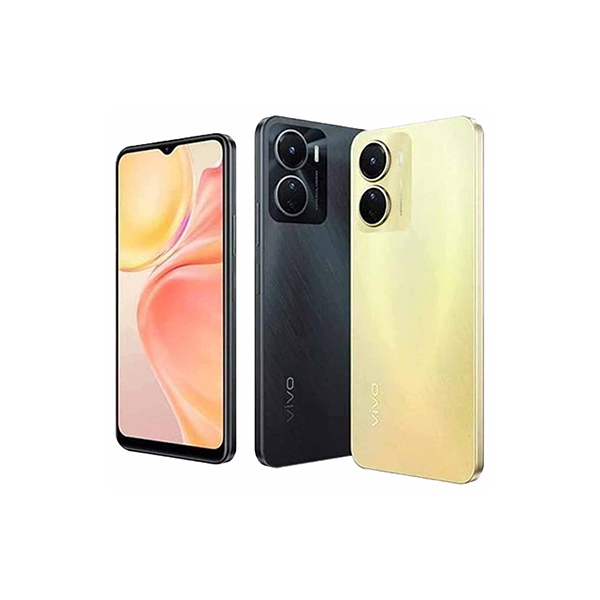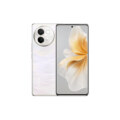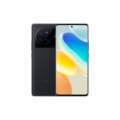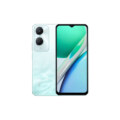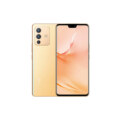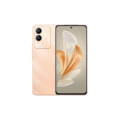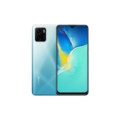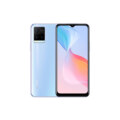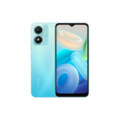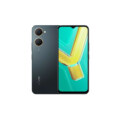Vivo Y17s



Specs
General
| Device Type | Vivo Phone |
| Announced | 18 September, 2023 |
| Released | 02 October, 2023 |
| Status | Available |
Design
| Dimensions | 163.7 x 75.4 x 8.1 mm |
| Weight | 186 g |
| Protection | Glass front, plastic frame, plastic back |
| Colors | Glitter Purple, Forest Green |
Display
| Refresh Rate | 60 Hz |
| Display Type Display Technology => A number of display technologies and types used in mobile phones => TFT (Thin Film Transistor), IPS (In-Place Switching), OLED (Organic Light Emitting Diode), AMOLED (Active-Matrix Organic Light-Emitting Diode), Super AMOLED (an even advanced version of AMOLED), Resistive Touchscreen (Resistive touchscreens contain two layer of conductive material with a very small gap between them which acts as a resistance), Capacitive Touchsceen (Capacitive touchscreen technology consists of a layer of glass coated with a transparent conductor) | IPS LCD |
| Size | 6.56 inches |
| Resolution | 720 x 1612 pixels |
| Display Colors Display Colors is refers to the number of different shades of colors that the screen is capable of displaying => 64K colors, 256K colors and 16 million colors, Obviously 16M is highest available range of colors and better than others. | 16M Colors |
| Pixel Density Pixel Density (PPI) is refers to the concentration of pixels on a particular display, measured in pixels per inch (ppi). Pixel density is calculated by dividing the diagonal pixel resolution of a display by its diagonal size, higher pixel density better display quality. | ~ 269 ppi |
| Touch Screen | Capacitive Touchscreen, Multitouch |
| Secondary Display | No |
Camera
| Front Camera | 8 MP, f/2.0, (wide) |
| Camera Setup | Double |
| Main Camera Camera is able to capture photographs and usually videos, The most important characteristics of a camera are the resolution (measured in megapixels), lens focus type (fixed or automatic), higher megapixel cameras are known to capture higher quality photos, but not always a good measurement of the photos quality. |
50 MP, f/1.8, (wide) 2 MP, f/2.4, (depth) |
| Video | 1080p@30fps |
| Camera Features | Geo-tagging, Phase detection, Panorama, HDR |
| Flash Flash Light => There is commonly two types of flash lights are used in camera mobile phones, LED Flash (LED flash offers lower power consumption with drive circuitry that takes up very little room, LEDs can be strobed faster than any other light source), Xenon Flash (xenon flash produces an extremely intense full-spectrum white light for a very short duration) | LED flash |
Hardware
| Operating System OS => Every computer system run on a base software called Operating System (OS). Operating System controls all basic operations of the computer (such as smartphone, PDAs, tablet computers and other handheld devices). The Operating System allows the user to install and run third party applications (apps), apps are used to add new functionality to the device. | Android 13 |
| Chipset Chipset is a group of integrated circuits designed to perform one or a more dedicated functions, often with real time computing constraints, Popular smartphones are equipped with more advanced embedded chipsets that can do many different tasks depending on their programming. | Mediatek Helio G85 |
| CPU CPU (Central Processing Unit) mostly known as processors, CPU processes instructions in order to carry out certain functions that make your device operate properly. Processors are often described as the brain of computers, smartphones and tablets, Smartphones and tablets rely on processors to carry out their every task, Processors are an incredibly important factor in selecting any type of computing device, including your smartphone. | Octa-core (2x2.0 GHz Cortex-A75 & 6x1.8 GHz Cortex-A55) |
| Architecture | 64 bit |
| Fabrication | 12 nm |
| GPU GPU (Graphics Processing Unit) is a single-chip processor designed to rapidly manipulate and alter memory to accelerate the creation of images in a frame buffer intended for output to a display, This includes things such as lighting effects, object transformations, and 3D motion. | Mali-G52 MC2 |
| RAM (Memory) RAM (Random Access Memory) is a type of computer memory that can be accessed randomly, any byte of memory can be accessed without touching the preceding bytes that allows information to be stored and accessed quickly from random locations. RAM is the most common type of memory found in computer systems, smartphones, tablets and other electronic devices. | 6 GB |
| Internal Storage Internal Storage is a data storage space (flash memory) mostly used in smartphones, tablets and other electronic devices where operating system, apps, music, photos, videos, files and other user data Is stored. | 128GB Built-in |
| Card Slot Memory Card Slot is a special slot for inserting a memory card. Memory cards allow you to expand the phone's built-in memory, A memory card (sometimes called a flash memory card or a storage card) is a small storage medium used to store data such as text, pictures, audio, and video, for use on small, portable or remote computing devices such as mobile phones, mp3 players, digital cameras. | |
| Sensors Sensors are electronic components that detects and responds to some type of input from the physical environment. The specific input could be light, heat, motion, moisture, pressure and location, The output is generally a signal that is converted to use in computing systems, a location sensor, such as a GPS receiver is able to detect current location of your electronic device. | Accelerometer, Compass, Fingerprint (rear mounted), Proximity |
Network
| SIM TYPE SIM (Subscriber Identity Module) is a small card that contains mobile network subscriber's account information. This allows the phone using the card to attach to a mobile network. The SIM card is most commonly associated with GSM and UMTS mobile networks. Moving a SIM card from one phone to another allows a subscriber to switch mobile phones without having to contact their mobile network carrier. SIM cards can also be used by a phone to store limited amounts of data, such as phone numbers and text messages. | Nano SIM |
| SIM Technology | Dual Sim, Dual Standby (Nano-SIM) |
| 2G Network | GSM 850 / 900 / 1800 / 1900 |
| 3G Network | HSDPA 850 / 900 / 1700(AWS) / 1900 / 2100 |
| 4G Network | LTE band 1(2100), 3(1800), 5(850), 8(900), 28(700), 38(2600), 40(2300), 41(2500) |
Multimedia
| FM Radio | |
| Stereo Speakers | NO |
| Loudspeaker | YES |
| Audio Jack | 3.5mm Audio Jack |
| Audio Features | 24-bit/192kHz Hi-Res audio |
Connectivity
| Wi-fi Wi-Fi is a popular wireless networking technology using radio waves to provide high-speed network connections that allows devices to communicate without cords or cables, Wi-Fi is increasingly becoming the preferred mode of internet connectivity all over the world. | Wi-Fi 802.11 a/b/g/n/ac, dual-band |
| Bluetooth Bluetooth is a wireless communications technology for exchanging data between mobile phones, headsets, computers and other network devices over short distances without wires, Bluetooth technology was primarily designed to support simple wireless networking of personal consumer devices. | v5.0 with A2DP, LE |
| GPS GPS The Global Positioning System is a satellite-based radio navigation system, GPS permits users to determine their position, velocity and the time 24 hours a day, in all weather, anywhere in the world, In order to locate your position, your device or GPS receiver must have a clear view of the sky. | AGPS, GLONASS, BDS, GALILEO |
| USB | USB Type-C 2.0, OTG |
| EDGE EDGE (Enhanced Data GSM Environment) is a wireless network technology generally considered the next step in the 2G network offers data transfer rates up to four times faster than ordinary GSM networks, Generally, EDGE is used for the purpose of wireless data transfer, such as sharing pictures and videos or browsing the Internet via a mobile phone connection. | |
| GPRS GPRS (General Packet Radio Service) is a packet oriented mobile data service on the 2G and 3G cellular communication system's global system for mobile communications (GSM), Generally, GPRS is used for the purpose of wireless data transfer, such as sharing pictures and videos or browsing the Internet via a mobile phone connection. | |
| Speed | 3G (HSPA 42.2/5.76 Mbps), 4G LTE-A |
| Wi-fi Hotspot | |
| NFC NFC (Near field communication) is a set of standards for smartphones and similar devices to establish peer-to-peer radio communications with each other by touching them together or bringing them into proximity, usually no more than a few inches. |
Features
| Messaging | SMS(threaded view), MMS, Email, Push Mail, IM |
| Web Browser Web Browser => a web browser is a software application used to locate, retrieve and display content on the World Wide Web, including Web pages, images, video and other files, The primary function of a web browser is to render HTML, the code used to design or markup webpages. | HTML5 |
| Games | Built-in + Downloadable |
| Torch |
Battery
| Battery Type Battery Type => Cell phones run on various kinds of batteries depending on the manufacturer, phone size or shape and features. There are basically four types of cell phone batteries => Lithium Polymer, Lithium Ion, Nickel Metal Hydride and Nickel Cadmium. | Li-Ion (Lithium Ion) |
| Capacity Battery Capacity is a measure (typically in Amp-hr) of the charge stored by the battery, and is determined by the mass of active material contained in the battery. The battery capacity represents the maximum amount of energy that can be extracted from the battery under certain conditions. | 5000 mAh |
| Placement | Non-removable |
| Wireless Charging Wireless Charging (Inductive Charging) uses an electromagnetic field to transfer energy between two objects. This is usually done with a charging station. Energy is sent through an inductive coupling to an electrical device, which can then use that energy to charge batteries or run the device. | No |
| Extra |
Fast battery 15W wired Reverse wired |
Vivo Y17s Detailed Review
Introduction:
The Vivo Y17s, released in 2023, is an affordable entry-level smartphone aimed at budget-conscious users. It brings several practical features for daily use, including a sizable display, a capable battery, and decent performance for its price segment. This review covers its design, display, performance, camera system, battery life, software, and more.
Specifications at a Glance:
- Display: 6.56-inch IPS LCD (1612 x 720 pixels, 269 ppi)
- Processor: MediaTek Helio G85 (Octa-core)
- RAM: 6 GB
- Storage Options: 128 GB, expandable via microSD (up to 1 TB)
- Rear Cameras: Dual 50 MP (wide, f/1.8) + 2 MP (depth, f/2.4)
- Front Camera: 8 MP (f/2.0)
- Battery: 5000 mAh, 15W charging
- Operating System: Funtouch OS 13 (based on Android 13)
- Audio: 3.5mm headphone jack, loudspeaker
- Dimensions: 163.74 x 75.43 x 8.09 mm
- Weight: 186 grams
Design and Build Quality
Aesthetics:
The Vivo Y17s sports a modern look with a flat back panel that houses its dual-camera setup. It features a plastic build but with a glossy finish that gives it a premium feel. The phone is available in attractive color options like Glitter Purple and Forest Green, which add to its aesthetic appeal.
Durability:
Despite its plastic construction, the Vivo Y17s feels sturdy in hand. However, it lacks water or dust resistance certification, which is expected at this price point. The front panel is protected by basic glass with no mention of advanced protective layers like Gorilla Glass.
Ergonomics:
With a 6.56-inch display, the Vivo Y17s strikes a balance between usability and portability. Its slim profile and 186-gram weight make it comfortable to hold and use for long periods. The rear fingerprint sensor is conveniently placed for easy unlocking, and it also supports face unlock for added convenience.
Overall:
The Vivo Y17s offers a clean and stylish design with a comfortable grip. While it isn’t the most rugged device, its attractive design and lightweight nature make it suitable for everyday use.
Display
Specifications:
- Size: 6.56-inch IPS LCD
- Resolution: 1612 x 720 pixels (HD+)
- Brightness: 530 nits (peak)
- Color Gamut: 83% NTSC
- Refresh Rate: 60Hz
Performance:
The Vivo Y17s features a 6.56-inch IPS LCD display that offers decent color reproduction and brightness for the price. With a resolution of 1612 x 720 pixels, it’s not as sharp as FHD+ displays, but it does the job for watching videos, browsing, and casual gaming. The 530 nits of peak brightness ensure the display is visible under direct sunlight.
While it’s a standard 60Hz display, the panel provides good viewing angles and acceptable color saturation for an entry-level device. It lacks HDR support, but for the price range, the visual quality is adequate for day-to-day tasks.
Summary:
The Vivo Y17s display offers solid performance for budget users. It may not provide the sharpness or vibrancy of higher-end models, but it delivers sufficient quality for most activities.
Performance
Hardware:
- Processor: MediaTek Helio G85 (Octa-core, 2x Cortex-A75 & 6x Cortex-A55)
- GPU: Mali-G52 MC2
- RAM: 6 GB
- Storage: 128 GB, expandable via microSD up to 1TB
Performance Evaluation:
The MediaTek Helio G85 chipset powers the Vivo Y17s, offering decent performance for everyday tasks like browsing, social media, and streaming videos. While it’s not designed for heavy gaming or multitasking, it can handle casual games like PUBG Mobile Lite or Free Fire at low settings without noticeable lag.
The 6 GB of RAM ensures smooth app-switching and allows for moderate multitasking, while the 128 GB of storage (expandable via microSD) provides ample room for apps, photos, and videos.
In terms of benchmarks, the Helio G85 offers decent scores for an entry-level chipset, providing enough power for light usage, though heavy users may notice some sluggishness under pressure.
Summary:
The Vivo Y17s delivers decent performance for its class. It’s well-suited for casual users, offering smooth operation for light tasks but struggling under more demanding applications and games.
Camera
Rear Cameras:
- Primary Lens: 50 MP, f/1.8 (wide), PDAF
- Depth Sensor: 2 MP, f/2.4
- Features: HDR, panorama, LED flash
- Video Recording: 1080p @ 30fps
Front Camera:
- 8 MP, f/2.0
Camera Performance:
The Vivo Y17s boasts a 50 MP primary camera, which is quite impressive for a budget phone. In well-lit conditions, it captures good detail with vibrant colors and decent dynamic range. The 2 MP depth sensor helps in portrait shots, providing a decent background blur, though the bokeh effect isn’t the most refined.
Low-light performance is where the camera starts to struggle, with noticeable noise and loss of detail in darker scenes. The absence of a dedicated night mode limits its ability to produce quality nighttime photos.
The 8 MP front camera is capable of taking good selfies in well-lit environments, but like the rear camera, it falters in low-light conditions.
Video Recording:
The Vivo Y17s supports video recording at 1080p @ 30fps, which is adequate for casual video recording. However, it lacks advanced stabilization features, so handheld videos can be shaky.
Summary:
The Vivo Y17s delivers good daylight photography for its price, with the 50 MP camera performing above expectations. However, its low-light performance and limited video features remind you that it’s an entry-level device.
Battery Life
Specifications:
- Capacity: 5000 mAh
- Charging Speed: 15W (wired)
Performance:
The 5000 mAh battery is one of the standout features of the Vivo Y17s, easily lasting a full day of moderate usage, including browsing, social media, and video streaming. For light users, it can stretch into a second day without needing a recharge.
The phone supports 15W wired charging, which is relatively slow by modern standards. It takes around 2 hours to fully charge the device, which could be a drawback for users who prefer faster charging speeds.
Summary:
With a large battery and power-efficient chipset, the Vivo Y17s offers excellent battery life. However, the 15W charging speed is somewhat slow compared to competitors.
Software
Operating System:
- Funtouch OS 13 (based on Android 13)
User Experience:
The Vivo Y17s runs Funtouch OS 13, which is based on Android 13. It provides a clean and user-friendly interface with plenty of customization options, including themes and icon packs. The software runs smoothly with minimal bloatware, though pre-installed apps can be removed if needed.
Funtouch OS 13 adds features like a dedicated game mode, split-screen multitasking, and easy access to shortcuts. Regular updates from Vivo keep the software fresh and secure, though entry-level devices may receive fewer major updates over time.
Summary:
Funtouch OS 13 offers a smooth and customizable experience with minimal bloat. It’s a user-friendly skin that runs well on the Vivo Y17s.
Pros & Cons
Pros:
- 50 MP Primary Camera: Excellent for daylight photography, delivering high-quality images in its price range.
- Long Battery Life: The 5000 mAh battery ensures all-day usage, with power to spare for lighter tasks.
- Affordable Price: Offers great value for money with decent features for its segment.
- Expandable Storage: Supports microSD cards up to 1TB, providing ample room for media files.
Cons:
- Low-Light Camera Performance: Struggles in low-light conditions, with noticeable noise and lack of detail.
- Slow Charging: 15W charging speed feels sluggish, taking around 2 hours for a full charge.
- 720p Display: While sufficient, the HD+ resolution feels underwhelming compared to Full HD displays in this segment.
- Plastic Build: Lacks premium materials, though this is expected at its price point.
Conclusion
The Vivo Y17s is a well-rounded budget smartphone that stands out with its 50 MP camera, impressive battery life, and solid performance for everyday tasks. It’s ideal for users looking for a reliable device that won’t break the bank. While it has its limitations, such as low-light photography and slower charging, it delivers excellent value for its price, making it a worthy contender in the entry-level smartphone market.
Review
Disclaimer Note
All prices in Pakistan is updated daily from the price list provided by local shops and dealers but we can not guarantee that the information / price on this page is 100% correct (Human error is possible), always visit your local shop for exact cell phone cost & rate.
